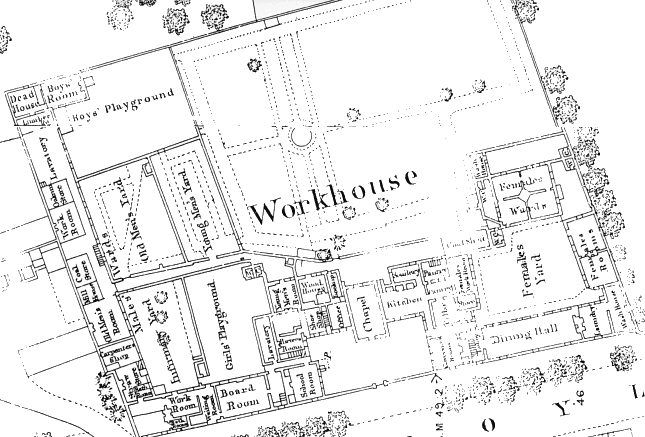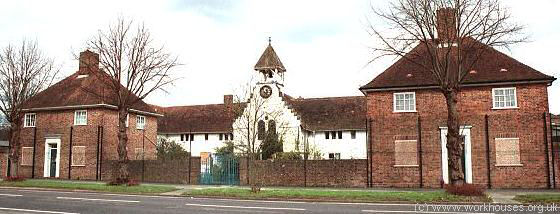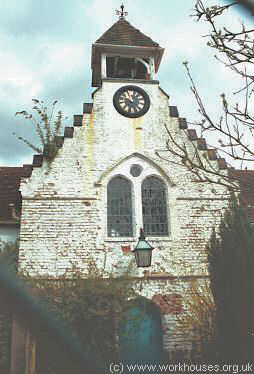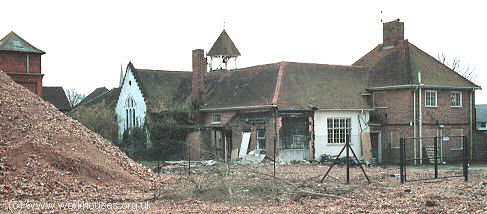Chichester, Sussex
[Up to 1834]
[After 1834]
[Staff]
[Inmates]
[Records]
[Bibliography]
[Links]
Up to 1834
In 1625, following a benefaction by William Cawley, Chichester erected almshouses on the east side of New Broyle Road. They were intended to provide homes for twelve decayed tradesmen of Chichester. In 1681, there is reference to use of the building as a workhouse.
A local Act in 1753 (26 Geo. 2, c.99 An Act for the better Relief and Employment of the Poor, and for enlightening the Streets, Passages and open Places within the City of Chichester and several Places adjoining thereto, and the Close within the said City)
united eight Chichester parishes (All Saints, St Andrew, St Bartholomew, St Martin, St Olave, St Pancras, St Peter the Great, St Peter the Less) and The Cathedral Close, to maintain the poor of the City. Thirty Guardians were to be elected annually by the inhabitants of the parishes, together with a number of ex officio Guardians, namely the Mayor, the High Steward, the Recorder, and local Justices of the Peace. Under the same Act, the almshouse was formally converted into a workhouse:
Whereas the right reverend Henry King hitherto Lord Bishop of Chichester and the right reverend Peter Gunning hitherto likewise Lord Bishop of the smae, did each of them pay unto the mayor, aldermen and citizens, the sum of one hundred pounds to be by them employed in providing a workhouse or manufactory to set the poor of the said city to work.
The board of Guardians met monthly and their powers allowed them to compel poor persons seeking relief to enter the workhouse, to direct constables to compel vagrants to enter the workhouse, and to detain and apprentice poor children whose parents were chargeable.
In August 1753, work began on extending the workhouse by addition of new wings, the paving of the cellars and pantries, the building of a wall around the garden, and the installation of new ovens. In April 1754, a brewhouse was planned to be built in the garden. The following year, the ceiling and windows of the chapel were repaired and 'seats fixed'. One room, with and unglazed and barred window, was used as a 'bridewell' for punishing miscreants. A spinning shop was also established.
An entry in the Guardians' minutes of April 1754 indicates the duties of the Master and Matron of the house, who were ordered to:
...have the care and management of the poor, keep the Accounts, learn the family to Read, Card, Knitt and Spinn, and all other Branches relating to Woolen Manufactory as the Guardians should Direct and for their Care and Trouble (over and above their Meat, Drink, Washing and Lodging) did agree to allow them the rate of five & twenty pounds a year.
In 1756, a list of workhouse regulations was compiled. It included the daily timetable, which was punctuated by the ringing of the workhouse bell.
From Lady Day
to Michaelmas | From Michaelmas to
All Hallowtide | From All Hallowtide
to Lady Day |
| Rising at 5 | 5.30 | 7 |
| Prayers at 6 | 6.30 | 8 |
| Work till 8 | 8 | 8 |
| Breakfast at 8 | 8 | 8.30 |
| Ev. Prayers at 5 | 5 | 4.30 |
| Supper at 6 | 6 | 5 |
| To bed at 9 | 8 | 8 |
In addition 'small children above two and under five shall be washed and cleansed and their heads combed by 8 o'clock in the morning in Summer, and by 10 in the Winter and taught to read according to their capacities'. For teaching the children, the Board ordered
That a man be appointed to teach the boys and a woman the girls to read, to write and to take care of the education, manner, and behaviour of the children, that every day in the summer and two hours in the winter and catechised twice a week, with a liberty for the Master or Mistress to change their hours of work and learning at their Discretion.
In 1756 there was evidently some trouble at meal times. Article 9 of the rules stated:
That great care be taken that the whole family do sett and behave decently at meals. That Grace be said by one of the house before Meals, that all persons who are not in their proper place before Grace is said are to loose that Meal and that none remove from the table till thanks are returned, that no Provision be carried out of the room, that each Person he allowed half an hour at Breakfast, an Hour at Dinner and half an hour at Supper, that all those who have not finished their task by Prayer time shall have no Supper.
Further rules aimed to preserve harmony in the house:
That every person endeavour to preserve good Harmony and look upon themselves as one Family and to prevent disputes and differences amongst themselves by Forging and telling of Lyes, each Person so offending shall upon good proof thereof be sett upon a stool during Dinner in the most public place in the Dining Room with a paper fixed on his or her breast whereon shall be wrote in capital letters Infamous Lyar and shall also loose that meal and for the second offence be put into the stock or wear the Pillory for two hours and be liable to the same punishment for the first offence if he does not sitt Quietly on the stool and Behave well.
There were also regulations dealing with going out and smoking in bed:
That no person unless sent out upon the business of the House by the Master or Mistress, presume to go out at the Street door without leave of one of the committee of the present Expenditors. who is to settle the time they are to return and they are then to apply to the Master or Mistress for a Ticket bearing the seal of this Corporation and upon their return immediately to return the ticket to the Master or Mistress who are to take Notice that they are returned in good Order at the time appointed, and be denied going for two months afterwards, and if any person does privately slip out at the street door or get over the Walls or any other way without leave or alone, such Person shall be taken up and confined and punished as Court directs.
That the master do take care that none of the Family be suffered to sitt up after nine o'clock in Summer and eight in the Winter except the nurses attending the Sick and that the Master or his Assistant see all the candles put out in the men's and boys' ward the Mistress and her assistant in the women's and girls' wand. At the same time to see that no person of either sex shall presume to smoke in bed nor in any other Room of the house without the Master's leave or make any noise or disturbance after going to bed upon pain of being put into the stocks for two hours and of loosing one meal's meat.
By 1765, tea-drinking was banned in the house following the scalding of two children:
Whereas a report has been made to the Guardians that a great number of the Poor persons of this House has made a constant practice of drinking Tea which has been attended with some very ill consequences in the Family, so that two of the children of the House are very much scalded, the Guardians in order to discourage this pernicious and scandalous practice in the Workhouse, and the better to prevent accidents of this sort, do hereby order that no tea from this time be permitted to be made in this house.
On Sundays, church attendance was required in clean clothes:
All those who are able to go every Sunday to Publick Worship both Morning and Afternoon shall be cleanly dressed and ready to attend the Master and Mistress and walk before them by two and two regularly soberly and discreetly to the place of worship and behave there all the time and not to go out of the Church in time of Service; and all to return back in the same manner and if any be found loitering or disorderly at Church or by the way for the first offence they shall be confined and loose their next meal and for the second offence to be confined and kept on bread and water for 24 hours and not go out for two months.
In 1756, new entrants to the workhouse were subjected to a rigorous induction procedure:
All persons on admission to deliver up household goods and Cloathes they are possessed of to the master who is to enter the same in a book in order to be cleaned and made usefull to service of this house and that every person should be carefully examined and if necessary striped and washed. That children's heads be shaved and that as many men and women as are free from vermin to be moved to the New workhouse as soon as the same be fit to receive them and that the rest of the family be housed and have necessary apparel provided for them before they are moved into the said workhouse.
In 1803, a number of badly behaved women were reprimanded:
Ordered that the following women go to Church twice on each Sabbath Day Wearing a Chip Hat and Linsey Woolsey Gown with the Letters B.C. [Bad Conduct?] on their Right arm with Yellow, with a Checked Handkerchief.
More serious misdemeanours, for example going out at night over the workhouse wall, could involve up to thirty lashes with the "Catt and nine tails" on the bare back — for women as well as men.
After 1834
The Incorporation's Local Act status exempted from most of the provisions of the 1834 Poor Law Amendment Act and it continued in existence until 1930 when West Sussex County Council took over its responsibilities.
The original 1625 building, with its central turreted chapel, was extended at various times. Its layout in 1875 is shown on the map below.

Chichester site, 1875.

Chichester workhouse from the south, 2001.
© Peter Higginbotham.

Chichester chapel from the south, 2001.
© Peter Higginbotham.
The 1625 almshouse and chapel block still survive, but many of the structures at the rear of the site were demolished in 2001.

Chichester from the north-west, 2001.
© Peter Higginbotham.
Children's Home
In 1913, the Incorporation established a children's cottage home in a house known as the Lavant Home, on Trumley Road, Lavant. The property had previously been a home for orphan girls. In 1924, the home could accommodate 20 children, with John Williams as its Superintendent. The property is now a private residence.
Records
Note: many repositories impose a closure period of up to 100 years for records identifying individuals. Before travelling a long distance, always check that the records you want to consult will be available.
-
West Sussex Record Office, County Hall, Chichester, West Sussex PO19 1RN.
Holdings include: Guardians' minutes (1753-1847, 1857-1930); Births (1896-1933); Baptisms (1906-34); Deaths (1896-1936); etc.
[Top of Page]
[Unions List]
[Unions Map]
[Home Page]






